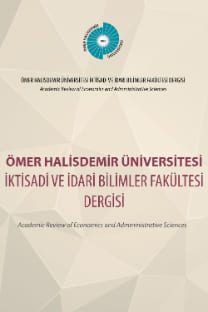TÜRKİYE’DE SÜRDÜRÜLEBİLİR MAVİ EKONOMİ İÇİN BALIKÇILIK DESTEKLERİNİN DEĞERLENDİRİLMESİ
2008 Küresel Krizi sonrası ortaya atılan “mavi ekonomi” kavramı okyanus tabanlı büyüme stratejisi olarak görülen; sürdürülebilir deniz ve okyanus kaynaklarının sağlanmasını amaçlayan bir konsepttir. Mavi ekonomi, balıkçılıktan deniz ticaretine, kıyı gelişiminden turizme, gemi yapımından, yenilenebilir kaynakların üretilmesine kadar, deniz ve okyanuslar içindeki tüm üretim ve pazarlama faaliyetlerini kapsamaktadır. Bu çalışmada mavi ekonomi bileşenlerinden biri olan balıkçılık üzerinde durulmuş ve Türkiye açısından mavi ekonomi kavramı, balıkçılık faaliyeti çerçevesinde değerlendirilmiştir. Sürdürülebilir deniz kaynakları için balıkçılık faaliyetlerinin balık türlerinin tüketilmesine yol açmadan, aşırı avlanmayı önleyecek şekilde yapılması gerekmektedir. Aşırı avlanma nedeniyle balık stoklarında azalma Türkiye’de de önemli bir sorundur. Balıkçılık destekleri ve tekne sayısındaki artış aşırı avlanmanın nedenleri olarak gösterilmektedir. Bu çalışmada Türkiye’de toplam balıkçılık desteklerinin (özellikle yakıt desteklerinin) ve tekne sayısının balık üretimi (avlanma) üzerindeki etkileri Python programında analiz edilmiştir. Yapılan analiz sonucu, toplam desteklerin avlanmayı arttırdığı sonucuna varılmıştır. Tekne sayısının ve yakıt desteklerinin tek başına avlanmaya etkisinin ise az olduğu tespit edilmiştir. Mavi ekonomi ve balıkçılık desteklerinin avlanma üzerindeki etkisi Türkiye’de daha önce fazla çalışılmamış bir konu olduğu için, araştırma literatüre katkı sağlayabilir ve farkındalık yaratabilir.
EVALUATIONOFFISHERIES SUPPORT INTURKEY FOR SUSTAINABLEBLUE ECONOMY
The concept of "Blue Economy" introduced after the 2008 Global Crisis is seen as an ocean-based growth strategy that aims to provide sustainability in marine and ocean resources. The blue economy covers all production and marketing activities within the seas and oceans, from fishing to maritime trade, from coastal development to tourism and from shipbuilding to the production of renewable resources. This study covers the fishing activity which is one of the crucial components of the blue economy and emphasizes the importance of the blue economy in Turkey in the context of fishing activity. For sustainable marine resources, fishing activities should be carried out in a way that prevents overfishing without causing the depletion of fish species. Reduction in the fish stocks due to overfishing is a serious problem in Turkey, too. The increase in the number of vessels and high fisheries subsidies are regarded as the reasons for overfishing. In this study, the impact of the total support payments, number of vessels and fuel supports on the fish production level is analysed in the Python program. As a conclusion, total support transfers cause an increase in fishing in Turkey. However, the number of vessels and fuel tax concessions have limited impact on overfishing. The blue economy concept and the impact of the fisheries subsidies on fishing have not been so much analysed previously, so this study can contribute to the research literature and thus raise awareness about sustainability in blue economy.
___
- Atakpa, D. (2018). Blue economy in a nutshell. Retrieved from https://www.researchgate.net/publication/327550968_BLUE_ECONOMY_IN_A_NUTSHELL_Capt_NN_SD_Atakpa.
- Bennett, N., Cisneros-Montemayor, A. M., & Sumaila, U. R. (2019). Towards a sustainable and equitable blue economy. Retrieved from https://www.nature.com/articles/s41893-019-0404-1
- Chawla, V. (2016). Rethinking the oceans: Towards the blue economy. Maritime affairs: Journal of the National Maritime Foundation of India, 12(2), 115–117. DOI: 10.1080/09733159.2016.1239365
- Çoban, M. N., & Ölmez, Ü. (2017). Mavi Ekonomi ve Mavi Büyüme. Turkish Studies, 12(3), 155–166. DOI: 10.7827/TurkishStudies.11122.
- Acs, M. K. (2019). Blue economy, the way to sustainable development of Bangladesh and its challenges and constraints. Retrieved from https://www.academia.edu/40672725/Blue_Economy_The_Way_to_Sustainable_Development_of_Bangladesh_and_Its_Challenges_and_Constraints.
- Kargın, H., & Bilgüven, M. (2018). Akuakültürde Akuaponik Sistemler ve Önemi. Bursa Uludağ Üniversitesi Ziraat Fakültesi Dergisi, 32(2), 159–173. Erişim adresi: https://dergipark.org.tr/tr/download/article-file/570377
- Mohanty S. K., Dush, P., & Gupta, A. (2019). Blue Economy Enhancing Growth and Sustainability, Research and Informatio System for Developing Countries. Blue Economy Forum. Retrieved from http://ris.org.in/blue-economy-enhancing-growth-and-sustainability
- Organisation for Economic Co-operation Development (2018). Review of fisheries 2017: General survey of fisheries subsidies. Retrieved from http://www.oecd.org/officialdocuments/publicdisplaydocumentpdf/?cote=TAD/FI(2017)14/FINAL&docLanguage=En
- Organisation for Economic Co-operation Development (2019). Fisheries support estimate database. Retrieved from http://www.oecd.org/agriculture/topics/fisheries-and-aquaculture/ Organisation for Economic Co-operation Development, & Food and Agricultural Organization (2019). Agricultural outlook 2019-2028. Retrieved from https://www.oecd.org/agriculture/oecd-fao-agricultural-outlook-2019/
- Pauli, G. (2010). The Blue Economy: 10 Years, 100 Innovations, 100 Million Jobs. Taos, US: Paradigm Publications.
- Türkiye Cumhuriyeti Cumhurbaşkanlığı Strateji ve Bütçe Başkanlığı (2019). Sürdürülebilir kalkınma amaçları ve göstergeleri. Erişim adresi: http://www.surdurulebilirkalkinma.gov.tr/wp-content/uploads/2021/02/SKA-ve-Gostergeleri-Kapak-Birlestirilmis.pdf/.
- Türkiye Cumhuriyeti Tarım ve Orman Bakanlığı (2020). Su ürünleri İstatistikleri. Erişim adresi: https://www.tarimorman.gov.tr/Konular/Su-Urunleri
- The Economist (2015). Investing in the Blue Economy: Growth and Opportunity in a Sustainable Ocean Economy. Retrieved from https://www.eco-business.com/research/investing-in-the-blue-economy-growth-and-opportunity-in-a-sustainable-ocean-economy/
- TÜİK (2020a). Balıkçılık Maliyet Yapısı. Erişim adresi: https://data.tuik.gov.tr/Bulten/Index?p=Su-Urunleri-2020-37252
- TÜİK (2020b). Üretim Yöntemi ile GSYH. Erişim adresi: https://data.tuik.gov.tr/Kategori/GetKategori?p=Ulusal-Hesaplar-113
- United Nations (2019). Blue Economy Concept Paper. Retrieved from https://sustainabledevelopment.un.org/content/documents/2978BEconcept.pdf
- World Bank (2016). Oceans 2030: Financing the blue economy for sustainable development. Retrieved from https://thedocs.worldbank.org/en/doc/446441473349079068-0010022016/original/AMCOECCBlueEconomyDevelopmentFramework.pdf
- World Bank (2017). The Potential of the blue economy: Increasing long-term benefits of the sustainable use of marine resources for small ısland developing states and coastal least developed countries. Retrieved from https://documents.worldbank.org/en/publication/documentsreports/documentdetail/523151496389684076/the-potential-of-the-blue-economy-increasing-long-term-benefits-of-the-sustainable-use-of-marine-resources-for-small-island-developing-states-and-coastal-least-developed-countries.
- World Wide Fund for Nature (2015). Yaşayan mavi gezegen raporu: Tehlike çanları Akdeniz’de de çalıyor. Erişim adresi: http://www.wwf.org.tr/?4540.
- ISSN: 2564-6931
- Yayın Aralığı: Yılda 4 Sayı
- Başlangıç: 2008
- Yayıncı: NİĞDE ÖMER HALİSDEMİR ÜNİVERSİTESİ
Sayıdaki Diğer Makaleler
Duygu KIZILDAĞ, Didem CANSEVER
Reyhan ÖZEŞ ÖZGÜR, Mehmet ZANBAK
Türk modernleşme tarihi sürecinde Adalet Partisi bağlamında muhafazakâr siyaset arayışı
Türev araç kullanımının firma performansı üzerine etkisi: BİST imalat sanayi firmaları uygulaması
Emine Ebru AKIN AKSOY, Fatma Betül ŞENGÜL
Entropi temelli Lanchester Savaş Modeli ile bir futbol maçının analizi
Nuri ÖMÜRBEK, Gamze KILINÇ, Meltem KARAATLI
KİMİN SESİ DAHA YÜKSEK? INSTAGRAMDA SOSYAL MEDYA FENOMENİ VE ÜNLÜ DESTEKÇİ KULLANIMI
Pandemi döneminde uzaktan eğitim memnuniyetini etkileyen faktörler
